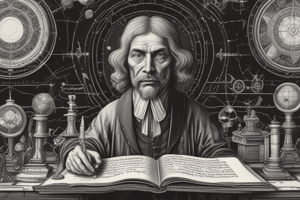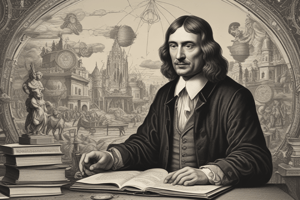Podcast
Questions and Answers
What is the primary purpose of technology according to the passage?
What is the primary purpose of technology according to the passage?
Which of the following is NOT mentioned as a way that science builds knowledge?
Which of the following is NOT mentioned as a way that science builds knowledge?
According to the passage, what is the relationship between science and technology?
According to the passage, what is the relationship between science and technology?
Which of the following is NOT mentioned as a way that technology provides sustainability to communities and societies?
Which of the following is NOT mentioned as a way that technology provides sustainability to communities and societies?
Signup and view all the answers
Which of the following is NOT a characteristic of science described in the passage?
Which of the following is NOT a characteristic of science described in the passage?
Signup and view all the answers
What is the definition of technology provided in the passage?
What is the definition of technology provided in the passage?
Signup and view all the answers
According to the definition of science provided, which of the following is NOT a key characteristic of science?
According to the definition of science provided, which of the following is NOT a key characteristic of science?
Signup and view all the answers
What is the primary purpose of science, according to the information provided?
What is the primary purpose of science, according to the information provided?
Signup and view all the answers
Which of the following is NOT a characteristic of the nature of science, as described in the text?
Which of the following is NOT a characteristic of the nature of science, as described in the text?
Signup and view all the answers
Which of the following best describes the definition of science provided in the text?
Which of the following best describes the definition of science provided in the text?
Signup and view all the answers
What is the origin of the word 'science' according to the information provided?
What is the origin of the word 'science' according to the information provided?
Signup and view all the answers
According to the information provided, which of the following is NOT a key characteristic of the nature of science?
According to the information provided, which of the following is NOT a key characteristic of the nature of science?
Signup and view all the answers
Who is considered the Father of Microbiology?
Who is considered the Father of Microbiology?
Signup and view all the answers
Which philosopher emphasized the power of reasoning and rational thinking in the 'Discourse on the Method'?
Which philosopher emphasized the power of reasoning and rational thinking in the 'Discourse on the Method'?
Signup and view all the answers
Which department manages Aquaculture, Food and Nutrition, Health, Meterology, Volcanology, and Seismology?
Which department manages Aquaculture, Food and Nutrition, Health, Meterology, Volcanology, and Seismology?
Signup and view all the answers
Which scientist is known for establishing the scientific method through reasoning using mathematics and physics?
Which scientist is known for establishing the scientific method through reasoning using mathematics and physics?
Signup and view all the answers
In which field did Antonie Van Leeuwenhoek make significant contributions?
In which field did Antonie Van Leeuwenhoek make significant contributions?
Signup and view all the answers
Who is known for claiming that mathematics can be applied in science and is considered a key figure in the scientific revolution?
Who is known for claiming that mathematics can be applied in science and is considered a key figure in the scientific revolution?
Signup and view all the answers
Study Notes
Definition and Purpose of Science
- Science explains the natural world and its components, providing ways to understand how it works and operates.
- Science builds knowledge for application and greater understanding, seeking solutions to existing problems.
Purpose of Technology
- Technology improves the environment, simplifying human activities, and empowering communities through civic awareness and engagement.
Historical Development of Science and Technology
- Ancient Egyptians and Mesopotamians contributed to the development of science.
Definition of Science
- Science is a methodical pursuit and application of knowledge and understanding of the nature and social world.
- Science is defined as a systematic enterprise that builds and organizes knowledge, a systematic study, or a system of knowledge covering general truth.
Nature of Science
- Science is subject to change as new evidence is found, derived from observation of the natural world, creative, and based on theoretical findings.
Purpose of Science
- René Descartes, a scientific thinker, emphasized the power of reasoning and rational thinking, establishing the scientific method.
Contributions to Science
- Department of Science and Technology (DOST) manages areas such as aquaculture, food and nutrition, health, meteorology, volcanology, and seismology.
- Antonie Van Leeuwenhoek pioneered work in microscopy and microbiology, laying the foundations for bacteriology and protozoology.
- Isaac Newton, an English mathematician, physicist, and astronomer, is a key figure in the scientific revolution, known for the invention of infinitesimal calculus and the theory of universal gravity.
Studying That Suits You
Use AI to generate personalized quizzes and flashcards to suit your learning preferences.
Description
Test your knowledge on the scientific thinker and modern philosopher René Descartes, focusing on his 'Discourse on the Method' published in 1637. Explore his emphasis on reasoning, rational thinking, and establishment of the scientific method through mathematics and physics.





